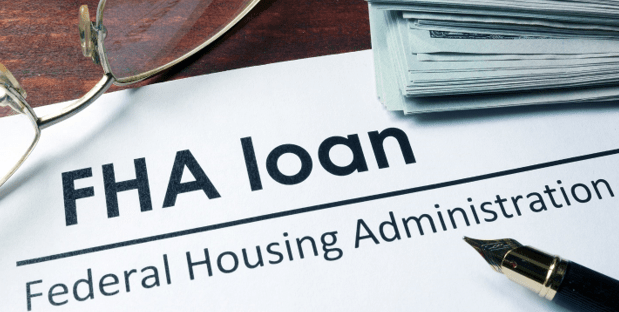Overview: FHA Mortgage Home Loans and What You Need to Know about Them
Before determining if FHA home loans are right for you, there are some important aspects about an FHA mortgage that you need to know.
Purchasing a home is a significant financial commitment—for first-time homeowners, their home is perhaps the most important financial commitment they will make.
Buying a home allows individuals to settle down, establish roots, and yields an important future investment. FHA home loans tend to make homeownership much more accessible.
In 2014, there were 4.9 million existing home sales and 435 thousand new home sales. The number of new home sales increased in 2015, capping off at 501,000.
A decade after the housing bubble began to collapse, the housing market is slowly beginning to recover. Part of this is due to a concentrated effort to loosen credit restrictions and make purchasing a home a more available option.



Photo courtesy of: GOBankingRates
FHA home loans are part of this concentrated effort to provide affordable options for first-time homeowners. An FHA mortgage can create a greater access point, providing loans with low interest and low down payment requirements.
Still, there are some important facts to know about a first-time home buyer FHA loan before choosing to invest in an FHA mortgage.
Purchasing a home for the first time can be a complicated and sometimes overwhelming process.
While many prospective homeowners consider an FHA mortgage as a valuable option, there are plenty of questions and concerns regarding the restrictions, regulations, and benefits of FHA home loans.
There are some crucial differences between an FHA mortgage and a conventional mortgage, and understanding the differences is important. Common consumer questions include:
- What is an FHA mortgage?
- What are the terms and conditions for FHA home loans?
- What are the different types of FHA financing options?
- How do FHA loan rates compare to conventional loan rates?
- What are the benefits and disadvantages of FHA mortgage loans?
Our review will strive to provide the most thorough overview possible of FHA home loans.
While purchasing a home can certainly be a stressful process, having a clear view of your finance options can help you determine whether an FHA first-time home buyer loan is the right decision for you.
See Also: US Bank Mortgage Reviews—What You Should Know (Home Mortgage, Complaints & Loan Reviews)
All-in-One Change Management Tools
Top Rated Toolkit for Change Managers.
Get Your Change Management Tool Today...
What Is an FHA Mortgage?
An FHA mortgage applies to a home loan that is insured by the Federal Housing Administration. Borrowers who receive FHA home loans pay for insurance through the FHA, which serves to protect lenders from suffering potential losses.
FHA mortgage loans are protected by their insurance, meaning that the FHA will pay the lender in case of a default. FHA financing has a long history within the United States, beginning nearly a century prior.
The FHA is a government agency that was created in 1934. Since its inception, it has risen to become the largest mortgage insurer in the world, providing access to more than 34 million properties. It is a unique government agency, as it takes no money from the taxpayers, operating solely on independent income. This income is generated through FHA mortgage insurance.
When the FHA was originally created, the housing market was in steep trouble. The 1930s saw increased financial trouble, including:
- Widespread loss of construction jobs totaling 2 million throughout the country
- Difficult mortgage terms and requirements for new homeowners
- Typical mortgage loan repayment terms of 3–5 years, beginning with a 50% down payment, and ending in a large balloon payment
- Only 1 in 4 households owned a home
In reaction, the FHA aimed to stimulate the economy through home and community development. By providing flexible loan terms and affordable rates, FHA home loans were able to successfully create homeownership as an option for millions of Americans. However, just as with any loan, an FHA mortgage comes with a unique set of terms and conditions.
Don’t Miss: What Is a Jumbo Loan? A Complete Guide (Loan Limit, Mortgage & Rates)
What Are the Terms and Conditions for FHA Home Loans?
Many of the terms and conditions for FHA home loans are similar to any other home loan. The vast difference will be in relaxed requirements, including easier down payments and greater accessibility. A quick view of the specific homeowner requirements for an FHA mortgage includes:
- Minimum credit score of 500: Typically, a credit score will determine either eligibility or down payment amounts. For FHA home loans, your credit score will factor into both. Credit scores in the 500–579 range are required to make a down payment of 10% of the overall value of the home. At 580 and above, the down payment for an FHA mortgage could be as low as 3.5%. In contrast, most conventional loans require at least a 5–10% minimum down payment. Although people with credit scores of lower than 500 are typically ineligible for FHA home loans, speaking with an FHA lender may provide certain exemptions.
- Only one FHA mortgage is allowed at a time: Because FHA home loans come with federal insurance, homeowners are restricted to taking out one loan at a time. This reduces the chance for default. There are, of course, a few exceptions to this rule. For example, purchasing a second home may make an additional FHA mortgage possible. Additionally, a co-lender who is going through a divorce typically gets the one-loan requirement waived and can use FHA financing for a new home.



- Fewer restrictions on debt-to-income ratio (DTI): For many lenders, a higher debt-to-income ratio may prevent them from utilizing a traditional mortgage. In contrast, the DTI requirements for an FHA mortgage often makes FHA home loans a better option for new homeowners. Conventional mortgages typically require a DTI of 45% or less, while an FHA mortgage allows for a DTI of 56–57%. The most common factors in debt-to-income ratio include student loans, credit cards, and vehicles.
- Borrowers must use an FHA-approved lender: Because the FHA is an insurer and not an actual lender, getting FHA home loans requires going through an official FHA-approved lender. This may involve borrowers shopping around to get the best FHA loan rates, as each broker may adjust the FHA mortgage requirements.
- Two-part mortgage premium requirement: There are two insurance requirements for FHA home loans. The first is the initial up-front premium, typically 1.75% of the loan amount. While FHA financing options allow for homeowners to include the premium within their loan amount, this first insurance amount needs to be paid when the FHA mortgage loan is dispersed. The second insurance requirement is paid each month, along with the FHA mortgage, as an annual premium. Insurance amounts for FHA home loans depend upon the length of the loan, dollar amount, and the loan-to-value ratio. For example, as of 2015, the typical FHA mortgage annual premium was 0.80% of the initial loan amount.
Though there are a handful of requirements, part of what makes FHA home loans so attractive are the loose restrictions on credit scores and debt-to-income ratios. Requirements for conventional loans may be prohibitive. This makes a first-time home buyer FHA loan into an accessible option for those who are bogged down in credit card debt, student loan debt, and car payments.
Perhaps the most difficult requirement to meet may be the two-part mortgage premium. Because FHA home loans come federally insured, the insurance rates tend to be a little higher than most. Conventional loans don’t charge an up-front insurance fee, and with good credit, annual insurance fees can be cut in half when compared to FHA mortgage insurance rates.
While there are a handful of restrictions and requirements, FHA home loans aren’t just for an FHA first-time home buyer. There are additional FHA financing options that may make an FHA mortgage into a worthwhile option.
Related: What Is the HARP Loan Program? Do You Qualify? Harp Loan Requirements
What Are the Different Types of FHA Financing?



Many FHA home loans offer attractive financing options, increasing their overall value.Photo courtesy of: Bankrate
Although the vast majority of FHA home loans are geared toward a first-time home buyer FHA loan, there are additional FHA financing options available. An FHA mortgage can be applied toward:
- FHA refinance programs: This includes an FHA refinance cash-out option, with a maximum loan-to-value ratio at 95%. Without utilizing the cash-out option, you can choose an FHA refinance program called a streamline refinance. With less credit requirements, less paperwork, and no appraisal necessary, a streamlined FHA refinance allows you to refinance your existing FHA mortgage at a lower rate. For FHA home loans, regardless of whether you are an FHA first-time home buyer or looking for a FHA refinance options, a borrower with a lower payment is less risky. As a result, FHA refinance programs are built for eligibility after a minimum of only 6 months of consistent payment on the original FHA mortgage.
- Reverse FHA mortgage: Reverse mortgage financing on FHA mortgage loans is much easier than with conventional loans. There are higher costs involved when compared to traditional reverse mortgage financing, but an FHA refinance comes with zero restrictions on how the money may be used. Although reverse financing on FHA mortgage loans will inevitably decrease the overall value of the home, this type of FHA refinance allows for quick payment for home improvements, medical costs, and virtually any combination of outstanding debt.
- FHA first-time home buyer loans: Perhaps the most common type of FHA financing, FHA first-time home buyer loans come with minimum restrictions. The trade-off is that the insurance premiums may be higher than a conventional loan. Although lower credit scores and higher debt-to-income ratios are accepted, the rates and terms for a first-time home buyer FHA loan may be substantially increased. FHA home loans can either be fixed-rate or adjustable-rate FHA mortgage loans. Adjustable-rate FHA mortgage loans are tied to a mortgage index, and typically offer lowered FHA loan rates for the first few years. A fixed-rate FHA mortgage will carry a constant, steady rate throughout the life of the loan, typically 30 years.
Although a first-time home buyer FHA loan is the most popular FHA financing product, there are additional options offered that may increase the overall value of FHA home loans. If an FHA refinance or reverse mortgage is a necessary supplement, FHA home loans turn these both into simple processes.
One important thing to consider—especially with a reverse FHA mortgage—is that while the process is easier, the associated costs may be higher when compared to traditional loans.
Popular Article: First-Time Home Buyer? What You Need to Know about Home Loans and Grants









How Do FHA Loan Rates Compare to Conventional Loan Rates?
Many FHA loan rates carry an interest of 4%, while conventional loan rates are closer to 4.29%. While this may not seem like a drastic difference, over time, these percentages can certainly add up. The same loan using FHA loan rates can save homeowners $1,080 annually when compared to conventional loan rates.
While interest rates tend to be slightly lower, a big factor in FHA loan rates is determined by the two FHA mortgage insurance premiums. Additional insurance premiums may offset the lowered FHA loan rates. Still, as FHA home loans are geared toward borrowers with higher debt and lower credit scores, FHA loan rates can still be beneficial.
With insurance premiums ranging between 1.3 and 1.7% for borrowers with a credit score ranging between 620–639, FHA home loans can easily fall below the pricing matrix for conventional loans. The Loan Level Price Adjustment Matrix (LLPA) offers conventional insurance premiums in a range of 1.15–3.50%.
In 2014, FHA loan rates for insurance premiums were dropped by half a percent. While this change seems incremental, this has produced widespread financial savings. More than 2 million homeowners have saved an average of $900 per year with their FHA mortgage loans.
Determining the overall helpfulness of rates for FHA home loans compared with conventional loans means taking a closer look at overall cost. The additional up-front insurance premium for an FHA mortgage may substantially increase the overall cost of the loan, making conventional loan rates more attractive.
The exception for this rule seems to be for borrowers with lower credit scores. These borrowers may experience unique cost-saving benefits from FHA loan rates, despite added insurance premiums.
What Are the Benefits and Disadvantages to FHA Home Loans?



As with any loan, FHA home loans come with a varying range of advantages and disadvantages. Photo courtesy of: Home Point Financial
Choosing an FHA mortgage over a conventional mortgage certainly comes with its own set of unique benefits and disadvantages. Before investing in FHA home loans, it is important to understand these innate differences between the two. Compared to a conventional loan, FHA home loans can offer these unique benefits:
- FHA home loans are assumable: As an assumable loan, if the FHA mortgage on your house comes with a 4% interest rate, even if overall mortgage rates have raised to 6%, your FHA home loans remain at the original rate. If you are selling your home, an assumable loan can be a worthwhile asset.
- Increased debt-to-income ratio with a cosigner: While FHA home loans already have relaxed requirements for DTI ratios, this flexibility increases with a cosigner. Conventional loans may not even accept cosigners with low credit scores, whereas FHA mortgage loans are much more flexible.
- Lower closing costs: For FHA home loans, borrowers have the ability to pay for up to 6% of closing costs through a mortgage broker or a real estate agent. In comparison, no more than 3% of closing costs can be paid through an additional party.
Free Wealth & Finance Software - Get Yours Now ►
Of course, despite the benefits that come along with FHA home loans, there are some disadvantages as well. When compared with conventional loans, an FHA mortgage can have the following downfalls:
- Mortgage insurance is necessary for all FHA home loans: Insurance is a crucial component for an FHA mortgage. In fact, FHA home loans cannot be issued without up-front and annual insurance payments. In contrast, a conventional loan will waive insurance payments for a 20% down payment.
- FHA mortgage insurance cannot be canceled: The insurance premiums that come along with FHA home loans will remain in place for the duration of the loan. This is a disadvantage when compared to conventional loans, as most offer to cancel mortgage insurance when the loan amount drops to 78% of the original purchase price.
- Less variety in loan programs: FHA home loans can be restrictive in that they avoid financing for second homes or additional investment properties. While some exemptions can exist, FHA financing is largely restricted to primary use housing.
Conclusion
Despite the inherent benefits and disadvantages, an FHA mortgage can be a worthwhile tool for an FHA first-time home buyer.
As a government entity, the Federal Housing Association has put decades of effort into making homeownership accessible and affordable over the long-term. Knowing the full range of requirements that come with FHA home loans is crucial when deciding on homeownership financing.
While purchasing a home is perhaps the most significant financial undertaking that occurs throughout a lifetime, it can still be affordable. Understanding options for FHA financing through an FHA mortgage will help determine whether using FHA home loans is the right decision for you.
Read More: How to Sell Your House Fast in 30 to 60 Days | Guide on Selling Your House Fast
AdvisoryHQ (AHQ) Disclaimer:
Reasonable efforts have been made by AdvisoryHQ to present accurate information, however all info is presented without warranty. Review AdvisoryHQ’s Terms for details. Also review each firm’s site for the most updated data, rates and info.
Note: Firms and products, including the one(s) reviewed above, may be AdvisoryHQ's affiliates. Click to view AdvisoryHQ's advertiser disclosures.



